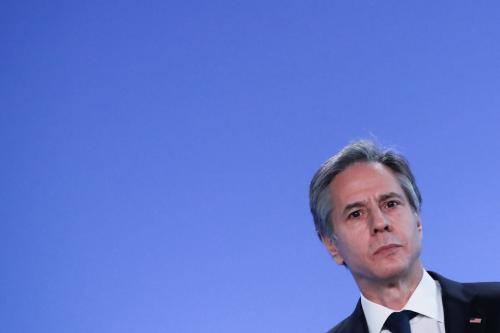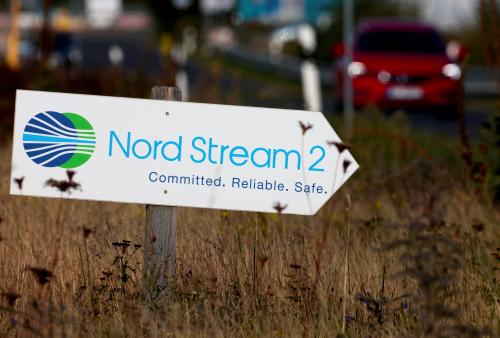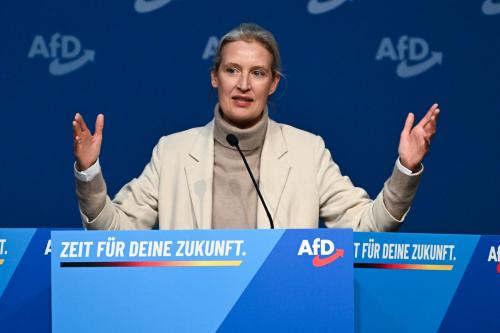While many Germans welcomed the election of Joe Biden as president, looming challenges, like Nord Stream 2, mean that repairing U.S.-German ties will require flexible diplomacy and an understanding of the domestic pressures on each side of the Atlantic, writes Steven Pifer. This post was originally published via Stanford CISAC.
The German government and many Germans breathed a sigh of relief when Joe Biden defeated Donald Trump in November. Mr. Trump damaged U.S. relations with its trans-Atlantic allies, and he often targeted Germany and Chancellor Angela Merkel for particular ire. Berlin has welcomed President Biden’s readiness to rebuild U.S.-German and U.S.-European ties.
All to the good, but rebuilding the U.S.-German relationship could well prove more difficult than it first appears. Trump’s four years have left nagging questions in the German capital about the future of U.S. politics and Trumpism, and several issues will entail difficult exchanges between Washington and Berlin.
The Trump presidency meant a difficult time for Europe and the trans-Atlantic relationship. He regarded the European Union as an economic adversary and questioned NATO’s value. He held Germany in particularly low regard, criticizing its trade surpluses—telling his first NATO summit that “the Germans are very, very bad”—and decrying its defense spending levels, even suggesting that Berlin owes “vast sums of money” to the Alliance and America. Trump had no personal chemistry with Merkel, reportedly referring to her as “stupid.” In 2020, she publicly referred to “the limits of populism and denial of basic truths” without naming names.
In May 2020, Merkel declined, in the midst of the global COVID19 pandemic, to attend an in-person G7 summit at Camp David. Shortly thereafter, Trump ordered the withdrawal of some 10,000 U.S. troops from Germany—a decision for which the Pentagon could offer no compelling strategic rationale (the Biden administration has suspended and ordered a review of the decision).
Berlin thus was delighted with Biden’s election, but Trump left much ground to make up.
What is the New “Normal” in America?
One senior German official privately observed that Trump had done real damage to German perceptions of the United States. While welcoming Biden’s desire to rebuild relations with Germany and Europe and seeing his election as marking a return to “normalcy” in Washington, he wondered whether that “normalcy” was acceptable to the large segment of the American electorate that had voted for Trump. Moreover, could Trump—or Trumpism—return to power?
In a separate discussion, another senior German official agreed that Trump had done significant damage to trans-Atlantic relations, noting that he had provided a boost to ideas such as strategic autonomy for Europe. He pointed to the Conservative Political Action Conference held in late February as reminding Germans that Trump and Trumpism were not over. What would the Republican Party look like in the future?
A third German official reiterated that Trump had caused many in Europe to contemplate how they might have to cope without strong U.S. leadership. Germans had lost confidence in parts of the American political class. It would be important that Biden define the level of U.S. leadership that his administration intended—and would be able—to provide.
Opinion surveys show that German citizens share these questions about America. In a late 2020 poll commissioned by the European Council on Foreign Relations, 53 percent agreed or strongly agreed that “after voting for Trump in 2016, Americans cannot be trusted.” The poll had 71 percent of Germans agreeing that the U.S. political system was somewhat or completely broken, though 48 percent believed that America could overcome its internal difficulties and contribute to solving global problems. However, when asked whether they trusted in Europe or the United States, 53 percent opted for Europe compared to 4 percent for America.
Difficult Issues Loom
Early moves by Biden, such as rejoining the Paris Climate Agreement and World Health Organization, both of which Trump had quit, and reaffirming the U.S. commitment to NATO’s Article 5 (an attack on one shall be considered an attack on all) won plaudits in Berlin. The Germans likewise welcomed Biden’s agreement to extend the New Strategic Arms Reduction Treaty with Russia, as well as his administration’s readiness to return to the Joint Comprehensive Plan of Action on Iran’s nuclear program and reengage with the UN Human Rights Commission. However, other issues that promise to figure prominently on the U.S.-German agenda could prove contentious between Washington and Berlin.
The Nord Stream 2 gas pipeline running under the Baltic Sea from Russia to Germany tops the list. The Biden administration, under pressure from Congress, has made clear its opposition to the pipeline, which is now about 95 percent finished. Secretary of State Blinken issued a statement on March 18 reiterating the administration’s intent to comply with Congressional legislation calling for sanctions and warning that “any entity involved in the Nord Stream 2 pipeline risks U.S. sanctions and should immediately abandon work on the pipeline.” On March 23, Blinken voiced U.S. opposition to the pipeline directly to German Foreign Minister Maas.
The German government, however, appears committed to finishing the pipeline, which has the support of the bulk of Merkel’s Christian Democratic Union (and the allied Christian Socialist Union) and the Social Democratic Party, the parties that together make up the current governing coalition. The German business community also supports the pipeline. The CDU/CSU-SPD coalition, moreover, has an incentive to complete the pipeline prior to the German national election in September. Polls indicate that, whatever coalition emerges following that election, the Greens Party will be part of it. The Greens strongly oppose Nord Stream 2, both on ecological grounds and because of their concern about the human rights situation in Russia. If the pipeline remains unfinished in September, this will be a major issue for the negotiation on forming a new governing coalition.
German officials note that stopping the pipeline now would be potentially costly; the German government could find itself on the hook for part or all of the nearly 10 billion Euros (about 12 billion dollars) already invested in the pipeline. They note that U.S. sanctions on German or European companies would provoke a backlash in Germany. Even those opposed to Nord Stream 2 caution against sanctions on German or European companies, which would go down badly with the pro-America CDU and could unite the European Union against the extra-territorial application of U.S. sanctions. German politicians dismiss American charges that buying gas from Russia feeds the aggressive Moscow machine and point out the United States now imports billions of dollars’ worth of oil from Russia.
Creative thinking by U.S. and German officials might find a way by which Washington could acquiesce in the pipeline’s completion without applying U.S. sanctions against German companies. That most likely will entail developing some benefits for Ukraine, which stands to lose the most if Nord Stream 2 is completed. German officials acknowledge that the Biden administration needs something to show if it does not go forward with sanctions, but the mood in Washington appears to be hardening, and time to find a settlement is running short.
China poses a second issue that could prove difficult for U.S.-German relations. As the Biden administration puts in place a policy to compete more effectively with Beijing, it will look to its European allies for support. Berlin, however, pushed the European Union to complete an investment deal with Beijing without waiting to consult with the incoming Biden administration and does not share U.S. concern about the security considerations of allowing Huawei, the Chinese IT giant, to take part in providing the German 5G network.
German business interests on this issue matter—a lot, as China has become Germany’s largest trading partner. While some in Berlin have become more wary of Beijing’s policy objectives and the means used to advance those goals, the German government does not want to have to choose sides between Washington and Beijing. It may well have been China that Merkel had in mind when she told the (virtual) Munich Security Conference on February 19 that, while Europe and the United States should develop joint approaches, “that doesn’t mean that our interests will always converge.”
That appears to have the backing of the German public. Asked what Germany should do if there were a disagreement between Washington and Beijing, the European Council on Foreign Relations-commissioned poll showed 16 percent favoring support for the United States, while 8 percent favored support for China and 66 percent opted for neutrality. (Worryingly for Washington’s effort to maintain a trans-Atlantic front against Russia, the poll showed identical numbers when substituting Russia for China.)
A third issue is German defense spending and the NATO-agreed goal that allies devote 2 percent of gross domestic product to defense by 2024. Germany is now spending much more on its military than in 2014 but likely will fall short of the 2 percent target. The Biden administration almost certainly will be more diplomatic than Trump on this issue. Still, it will look to NATO allies in Europe to bear a larger share of the burden of deterring and defending against Russia as the United States shifts its military focus to the Asia-Pacific region.
And a German Election
One complicating factor is that Germany will soon move into the campaign season for the national election in September. As one German think-tank analyst put it, the issues that would help solidify U.S.-German relations—suspending construction of Nord Stream 2, adopting a tougher policy toward China, dramatically bolstering defense spending, and moving forward to procure a nuclear-capable fighter to replace the aging Tornado and sustain Germany’s nuclear-sharing role in NATO—are not positions that will attract votes. Quite the opposite, too close an embrace of Washington’s views on these questions could drive ballots to other parties.
The September election, moreover, will mean an end to Merkel’s long run as chancellor. Most expect her replacement to come from the CDU or CSU, though prognostications are less certain after the lackluster showing by the CDU in March 14 state elections in Baden-Wuerttemberg and Rhineland-Palatinate. Regardless, a new chancellor will need time to get up to speed, and that could affect how quickly he or she might engage and decide on issues of interest to Washington.
This does not mean that the U.S.-German relationship is headed for trouble. The good news is that both Washington and Berlin clearly want to restore the comity that was lost during the Trump administration. However, building that relationship back, and not letting things get derailed by difficult issues that could divide the two allies, will require flexible diplomacy and that each take some account of the other’s interests and domestic pressures.
The Brookings Institution is committed to quality, independence, and impact.
We are supported by a diverse array of funders. In line with our values and policies, each Brookings publication represents the sole views of its author(s).











Commentary
Rebuilding US-German relations: Harder than it appears
March 25, 2021